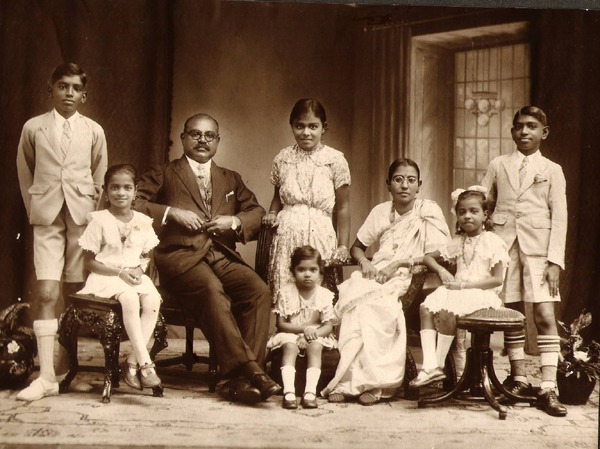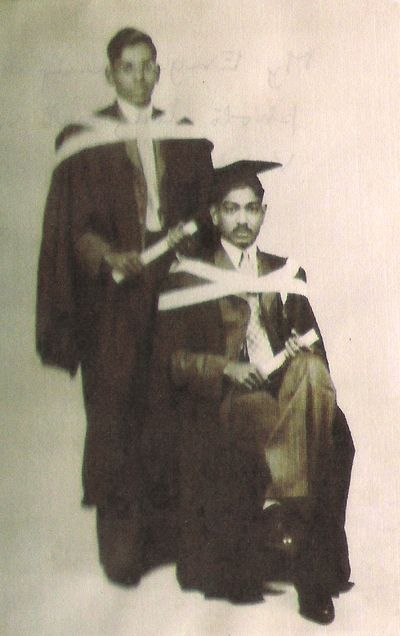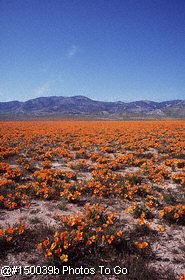|
Durai's Space
|
||||||
|
The family photo above of our parents with all the six children was taken in Rangoon in 1930. From left to right: my brother Victor, Suri, my dad Dr. A. J. Masillamony, Stella (standing), Kamala (sitting), my mum Thangam Mony, Chandra and myself. At the request of my dear ones, I am writing this in great humility, not to boast about myself but only to show what God in His mercy has done to an ordinary man like me. Born
in I was born in Christian values from
my parents My dad, earlier worked as a Burma Government Medical Officer
and later as Medical Practitioner running his own clinic at Early role models My dad, along with such Christian stalwarts like my uncle
Dr. M. D. David, Mr. Dharmaraj, Mr. Gnanaviran, Mr. C. T. Venugopal, a Brahmin convert and Mr. G. K. S. Dawson were all role
models for me in shaping my future Christian life. He was also well known for his social service activities in connection
with Street Boys’ Refuge and in the Rangoon YMCA. In recognition of the Social service rendered by him, he was made
an Honorary Magistrate at My mum on the other hand took full control of running the house in looking after and bringing up the six children in true Christian faith. She ensured that we read the Bible every day, had family prayers every night without fail, memorized Bible verses every Sunday and saw to it that we attended church service every Sunday, took part in Sunday school, Girls’ guild and Boys’ guild, joined the choir and served as Altar servers in the church. This is the Christian foundation that we were all brought up in, which gave us a wonderful start in our spiritual journey into the future. My
parents had two sons and four daughters, my eldest brother Victor Mony and four sisters, Stella, Suri, Chandra and Kamala.
All of us started schooling at St. Gabriel’s Extracts from
a few of the certificates given by the College Professors and Engineering Departmental Heads are given below. From Mr A. Burton,
Supervisor of Studies, College of Engineering: Throughout his entire
course in the Department, he was the best student of his year and in the Final examination secured First Class Honours with
exceptionally high results. This man is perhaps the most brilliant student ever turned out by
this Department and secured his Degree at a very early age. At this time, he was only 19 years of age and competed with students
From Prof. F. Webster, Professor
of Engineering, University of His academic record
in this Department has been a remarkable one and his quick grasp of the more mathematical part of the training really imposing.
From the Registrar,
Joseph Durai Raj who
passed the B.Sc. (Hons.) Examination in Engineering of this University in March 1939 with First Class Honours, stood highest
in the aggregate of the three Examinations leading to the Degree of B.Sc. (Hons.) in Engineering in the University and is
eligible for the award of the Todarmal Talwar Memorial Gold Medal. From Mr. R. S. Andrews,
Chief Joseph Durai Raj is
an Honours Graduate of the From U Aung Gain,
Secretary, Ministry of Public Works and Labour, Union of From
December 1945 onwards, he is officiating as an Executive Engineer in the Buildings and Roads Department having served in the
first instance as ‘Works Officer’ in the Office of the Chief Engineer to deal with all works cases and in charge
of the Central Design Office. He had done well. He was later put in
charge of the During 1948, his services
were partly lent to the ............................................................................................... From soprano to alto to tenor at St. Gabriel’s Church choir Sportsman and athletic champion Youngest lecturer, teaching students 6 years older
At my first appointment as Lecturer in the |
|
|||||
|
Layout of the Mingaladon Airport, Rangoon Yangon, (formerly Rangoon) is the capital city of Myanmar (formerly Burma.) |
||||||



